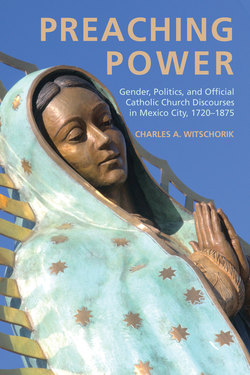Описание книги
This book uses a gender perspective to examine sermons and other officially endorsed discourses of the Catholic Church in eighteenth- and nineteenth-century Mexico City. Analyzing the different ways that, over time, gendered images, metaphors, and hagiographical examples were used in sermons and other documents, the book examines how the church negotiated challenges to its cultural and ideological hegemony. Beginning with sermons from the early eighteenth century, the author follows the evolution of church discourses as preachers reveled in Baroque analogies, embraced ideals of the Enlightenment, targeted women's alleged moral vices at times of political crisis, and ultimately turned to notions of women as «the devout sex» in order to combat incipient liberalism. Put another way, liberals after independence were not the only ones to assert a kind of «republican motherhood»: preachers countered with a vision of «Catholic motherhood» that had great resonance in Mexico even into the twentieth century.
